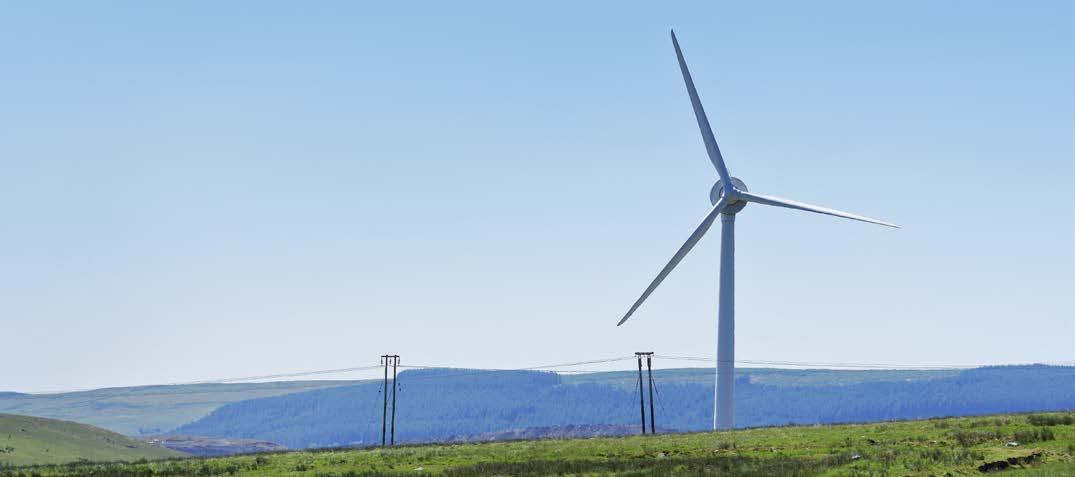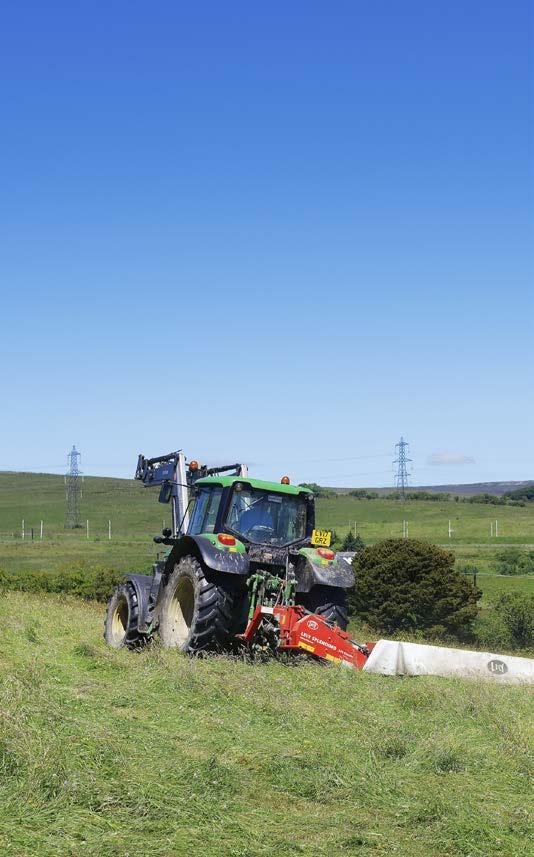
5 minute read
Greener
There is an urgent need to address the threat posed by climate change and biodiversity loss. Wales has some of the greatest environmental assets of any small country, but our basic ecosystem is in decline. This year we declared a climate change emergency, placing ourselves on the leading edge of a wider social movement to combat the crisis and restore our natural environment.
Accelerating decarbonisation to combat climate change
Since declaring a climate change emergency, we have increased our carbon reduction target to 95% by 2050, with an ambition to get to net zero. This year we published our low carbon delivery plan Prosperity for All: A Low Carbon Wales, which sets out 100 policies and proposals to reduce carbon emissions. Our carbon budget for 2020 is a 27% reduction from 2016, demonstrating our ambition to decarbonise at pace. We are committed to establishing world-leading renewable energy industries. The Energy Generation in Wales Report 2018 found more than 50% of our electricity came from renewable sources, up from 19% in 2014, and that there are nearly 69,000 renewable energy projects in Wales. We’ve secured EU investment to establish a marine energy sector in Wales and we will be trialling some of the most advanced wave and tidal technologies in the world. We helped take an estimated 177,000 homes out of fuel poverty between 2008 and 2018, more than halving it across Wales. Our Warm Homes scheme, has provided energy efficiency advice to 112,000 people and installed home energy efficiency measures in more than 50,000 homes. These improvements delivered an average estimated annual energy bill saving of £409. The scheme has been extended to 2021 and we are also developing an energy retrofit programme for the next Senedd term to contribute to our ambition of achieving net zero carbon.
Reducing waste and restoring our environment
Wales has the fourth highest recycling rates in the world – we recycled, reused or composted 63% of our waste. Our aim is to create a circular economy where waste is reduced and assets are re-used. In April 2019, we launched a £6.5m Circular Economy Fund, offering grants to businesses to increase their use of recycled materials in manufactured products, components or packaging. We are taking a variety of approaches to make a circular economy a reality. We have started work to ban some single use plastics to help preserve our environment, going further than equivalent plans in England. We have consulted on deposit return schemes for drink containers and a polluter pays scheme to hold businesses to a greater account for their impact on our environment. Our Landfill Disposals Tax Communities Scheme awarded £1.4m of grants to 44 community and environmental projects in 2018-19. We are developing an Environmental Growth Plan and in June 2019, we held our first Clean Air Day Wales to raise awareness of the causes and effects of air pollution. We continue to develop a Clean Air Bill. Our Noise and Soundscape Action Plan has been awarded a prestigious John Connell Prize by the Noise Abatement Society, and more than 70 communities and organisations have received Bee Friendly awards under our Action Plan for Pollinators. We need to rapidly increase the scale and pace of tree planting in Wales and we are scoping the delivery of a National Forest, building on the success of the Wales Coastal Path. This 20-year project will link up sites across the country into a single continuous forest, creating a symbol of national pride. The National Forest is supported by our Plant! tree planting scheme, which plants two trees for every child born or adopted in Wales – one in Wales and one in Uganda. These trees contribute to our Mbale programme, which plants trees in the heavily deforested region of Mount Elgon in Uganda. The Mbale programme, which is part of our globally responsible Wales for Africa initiative, has planted 10 million trees since 2014 with a goal of planting 25 million by 2025.
Mitigating the impact of climate change
We need to understand the risks arising from climate change and what they mean for our communities and places. This year we developed Prosperity for All: A Climate Conscious Wales. This is our second climate change adaptation plan for Wales, and shows how we are responding to the most urgent risks and consequences of climate change. The plan outlines how we will build the resilience of our communities and natural environment, focussing on flooding, drought, our eco-system and the agriculture sector. This year we published guidance to encourage natural flood management, invested £44m in tackling flood and coastal erosion risk and launched our £150m Coastal Risk Management programme which will run until 2022. We introduced the new Flood and Coastal Erosion Committee in April 2019 and consulted on a 10-year National Strategy for Flood and Coastal Erosion Risk Management in Wales.

Supporting farmers and protecting the Welsh food industry
Agriculture plays a huge role in the prosperity of our economy, the health of our communities and the diversity of our natural environment. We need to ensure that our farms have the resilience they need to thrive and protect our natural world. Although immensely challenging and disruptive, Brexit brings with it the possibility of designing a bespoke, made-in Wales system for supporting farmers. In Brexit and Our Land, we set out how we will keep farmers in sustainable farms which support the wellbeing of the farming industry, rural communities and all of the people of Wales. This year we consulted on Sustainable Farming and our Land, which contains detailed proposals on how we would support farmers when we leave the Common Agricultural Policy. This includes a refreshed focus on precision agriculture, knowledge transfer, and working with wider supply chains. Our world-leading food sector has shown how investing in our environment can support the economy of Wales. This year we consulted on proposals for a new strategic plan for the Food and Drink sector in Wales. This plan sets out our vision, developed with the Food and Drinks Wales Industry Board, for a strong and vibrant Welsh food and drink sector with a global reputation for excellence. We welcomed the global food and drink industry to Wales for BlasCymru/TasteWales in March 2019, generating nearly £22m in new business opportunities and building on the £16m of business secured from the 2017 BlasCymru event.







